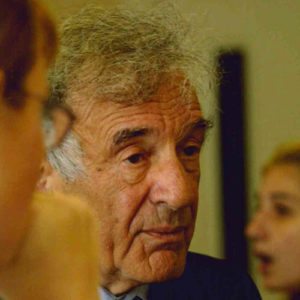From the Holocaust to Darfur: If We Had Only Learned Our Lesson
Elie Wiesel was a Distinguished Visiting Professor of Humanities in the winter months at Eckerd College for 24 years, and my wife and I were honored to become friends with Elie and his wife, Marion, during those years.
Elie Wiesel was born and raised in a small rural town in what is now Romania, and his youth—until it was interrupted—was spent in the completely religious world of Eastern European Jews, a world that was probably more devout, more learned and more routinely focused on the relationship of God to man than any in human history. In 1943, Nazi Germany began transporting the Jews of Eastern Europe to the death camps. Elie’s grandfather and his family were taken that year, and the next year Elie’s entire family—his mother, father and three sisters—were transported with him to Poland.
In his memoir of this time, Elie writes, “Our world contracted steadily. The country became a city, the city a street, the street a house, the house a room, the room a sealed cattle car, the cattle car a concrete cellar. …” Elie was 15 years old. Imagine the warm, embracing extended family of the village—and now the Gestapo, the fear, the cold, the hunger, the trains, the herding of people like cattle and, most painfully, the wondering why God has abandoned His chosen people.
Liberated by the American Third Army in 1945, his parents and a sister left dead in the camps, Elie later said, “My only experience in the secular world was Auschwitz.” In the years following the war, Elie studied at preparatory schools in Paris and at the Sorbonne and spent 10 years as a journalist and teacher. He had vowed to recount his experiences only after 10 years of silence. Encouraged by the Catholic writer François Mauriac, he wrote Night in 1958, one of the most moving and now famous books ever published in any language. In 2006, Night was reissued in a new English-language edition featuring a new translation by Marion, who has translated most of his work into English since they were married more than 40 years ago.
If Elie had been only a writer, he would be one of the world’s most distinguished men of letters. And he is that: He has published 60 books—novels, essays, stories, memoirs—and received countless prizes and honors for his writing. But he was not just a writer, or even primarily a writer: He was an activist, an activist for peace, for human rights, for understanding of the powerless, and for the discussion of urgent ethical and moral issues confronting mankind. He was honored even more for his work as an activist than for his writing: In addition to more than 100 honorary degrees, he was awarded the Congressional Gold Medal, the Medal of Liberty and the Presidential Medal of Freedom by the United States; the Grand-Croix in the French Legion of Honor; and a Knight of the British Empire by the Queen of England. In 2010, President Obama presented him with a National Humanities Medal. He was, most famously of course, awarded the Nobel Peace Prize in 1986.
Perhaps no man alive achieved the persuasive power of moral conviction that Dr. Wiesel did, through his writings of searing, emphatic, unswerving witness and by virtue of a thoughtful, urbane life as an unparalleled teacher and counselor to the captains and kings of the world. Elie used every award, every honor, and every opportunity his writing and recognition brought him to serve the same cause that motivated him to write Night—to fight oppression and work for peace and human rights wherever he could: in the former Soviet Union, in the Middle East; in Rwanda and Ethiopia and Cambodia; in South Africa, South America, the Balkans; and in Darfur.
Dr. Wiesel brought together in his writing, his teaching and in his life the Talmudic tradition of scholarship and the Hasidic message of kavanah, the purity of the heart’s intent, to a world desperate for a vision of peace. He was, for our time, the voice of the Hebraic tradition, the voice of the exiled Judeans of the 137th Psalm, singing 2,500 years ago in their Babylonian captivity, “By the rivers of Babylon, there we sat down, yea, we wept, when we remembered Zion.” His every note remembered Zion; his every utterance kept the faith of the harpists of that Psalm, who sang, “If I forget thee, O Jerusalem, let my right hand forget her cunning.”
Elie Wiesel did not, could not, would not forget, and our culture learned to rely on his memory, a memory that carries his Jewish tradition and its melodic, devoted, complex virtues and insistent narrative of man’s responsibility to build a better world into the heart of what it means to be not only a Jew, but a Christian, a Muslim and any person of good will. His model was Rashi, the great Talmudic scholar who influenced not only generations of the Jewish scholarly community but Christian theologians as well, Catholic and Protestant, from Nicholas de Lyre to Martin Luther. Rashi is the father of the art of commentary, the work of which celebrates, as all scholars must, memory above all. Dr. Wiesel’s 50th book is titled, simply, Rashi.
As Elie remembered his Talmudic masters, his childhood in Central and Eastern Europe, the world of the shtetl and Shabbat, a world that was incinerated in the ovens of Auschwitz and Treblinka, he remembered for us. As he remembered, spoke, wrote and told stories and examined the problems and politics of the day, his memories became ours, and his vision of peace became ours as well. May his compelling, transcendent voice never fall silent.
—Donald R. Eastman III, Ph.D.
President, Eckerd College


